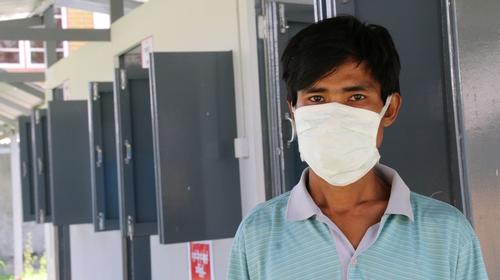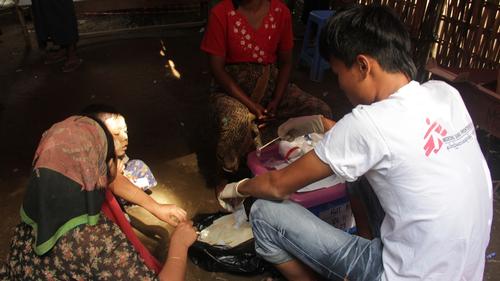Decentralization key for scaling up MDR-TB treatment in Myanmar.
Ko Thet Oo started treatment for multi-drug resistance tuberculosis (MDR-TB) about two months ago at the Médecins Sans Frontières (MSF) HIV/TB clinic in Insein Township, Yangon. It is a 12 hour and 11,000 KyatApproximately 10 US dollars; as a general worker he would earn approx. 1-2 dollars a day bus ride away from his home village. Ko Thet Oo is already accustomed to this journey – he also has HIV and used to make this trip once every three months to receive antiretroviral (ARV) medication for it. However, MDR-TB requires daily treatment: a minimum of six months of painful injections and 20 months of taking a cocktail of a minimum of 11 drugs a day. He now has no choice but to move closer to the nearest facility offering integrated HIV and MDR-TB care, far away from family, friends and comforting social networks back home.
“In my native town, there is only a general hospital and you cannot get the right medication from there. It would be great if treatment was provided there for poor people like me, as most of the patients from rural areas have to come to big cities [like Yangon] to cure the diseases,” he says.
Ko Thet Oo is not alone. Many of those diagnosed with MDR-TB must choose to leave loved ones, social support systems, and often jobs and livelihoods behind to get treatment in one of the few medical facilities offering the specialized care they need in Myanmar.
Though there are plans by the National TB Program (NTP) to significantly increase the number, to date there are only 68 facilities scattered over 36 townships that offer MDR-TB treatment nationwide. And they are mainly concentrated in the state and regional capitals, out of reach of patients like Ko Thet Oo living in more remote areas.
MDR-TB is recognized as an alarming national health crisis in Myanmar, with an estimated 9,000 new cases each year. However, only 1,537 patients received treatment in 2014 – far too few to curb the deadly epidemic.
There are many reasons, but key among them is a lack of resources, including staff and appropriate medical infrastructure especially in the rural areas, as well as the regimen's long duration and complexity. Most of the treatment, however, could be simplified and brought down to community level.
“For many people, putting their lives on hold for nearly two years to complete the full treatment course is an impossible choice,” says Nana Zarkua, Country Health Director for MSF in Myanmar. “Simplifying care and bringing it closer to their homes could be an important first step to keeping them alive and preventing the disease from spreading.”
Patients who choose to face the hardship of MDR-treatment and move to a central treatment site are clearly committed to beating the deadly disease. But their suffering is doubled. Their physical and psychological hardship from the long and painful cure is compounded by loss of income, home sickness and solitude.
“Depression is a common side effect of one of the drugs that MDR-TB patients receive and many patients suffer from it. They need a lot of support to get them through,” says Yin Min Thu, Counsellor in charge of MDR-TB patients for MSF in Yangon. “When you are close to home, your relatives, neighbors and other social networks can help you to endure the treatment all the way through.”
Ko Thet Oo is lucky: his wife was able to come and stay with him in Yangon when he started his treatment. “She helps me a lot, especially when I am feeling sick from the drugs, when my body and my bones hurt,” he says. “She also cooks our local food, which is spicier than the food in Yangon and which I miss. Unfortunately, the cost of living here is so much higher that she will have to go back to our village as soon as possible, as soon as I feel better.”
To enable patients financially to seek and remain on treatment, MSF helps its patients to relocate by offering accommodation, as well as a daily transport allowance, food rations and a small monthly stipend. Of course, this is not possible on the large scale required to address the problem adequately. It is a temporary solution until decentralized treatment becomes available.
Decentralization of diagnosis and treatment is a crucial step to scaling up the MDR-TB response in Myanmar – it will allow more people to access the treatment they need and thus help reduce transmission. However, as in many other countries, health authorities in Myanmar are struggling with a lack of resources, funding, and sufficient trained personnel, particularly in rural areas.
“As diagnosis and treatment of MDR-TB is quite complex and requires significant financial and human resources, additional support from donors and other stakeholders involved in the health system is imperative to help Myanmar in scaling up the its MDR-TB program to an adequate level,” says Zarkua. “Ultimately, being able to bring the whole package of diagnosis and treatment closer to patient’s homes is key for controlling the epidemic.”





